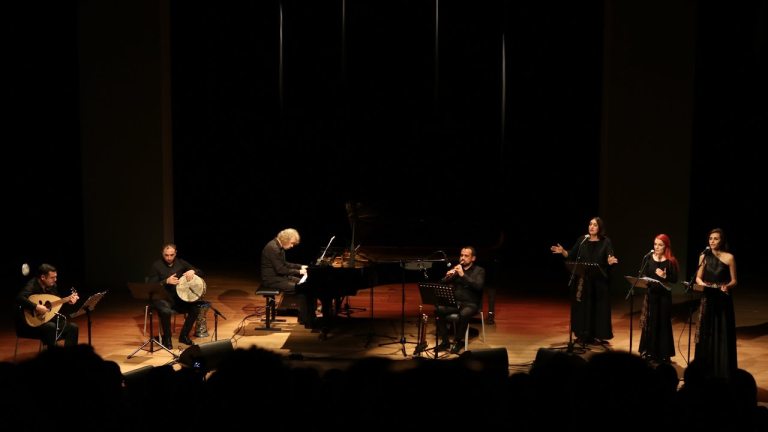
Longwood Debut
The Naghash Ensemble is a gathering of some of the finest musicians and singers in Armenia, who all have a deep knowledge of Armenian folk and spiritual music—and beyond. Each member brings something truly unique to The Naghash Ensemble sound.
Hasmik Baghdasaryan, soprano
Tatevik Movsesyan, soprano
Arpine Ter-Petrosyan, alto
Harutyun Chkolyan, duduk
Aram Nikoghosyan, oud
Tigran Hovhannisyan, dhol
John Hodian, piano/composer
The idea for The Naghash Ensemble came when composer John Hodian first heard soprano singer Hasmik Baghdasaryan singing in an ancient pagan temple outside of Yerevan, Armenia. She was singing medieval Armenian spiritual music, and her voice was astounding. Adding to the magic was the unique acoustics of the temple. The sound haunted Hodian for days afterward, and he became determined to write something that would use this sound in a new way.
Hodian had a clear picture of the type of music he wanted to create for Hasmik's voice, but it took years to discover the right text. He spent months researching in the libraries of Yerevan, New York, and Berlin. When Hodian finally came across a small fragment of the medieval Armenian poet Mkrtich Naghash, the words leaped off the page and into his soul. He knew he had found his text. Being in Yerevan at the time, Hodian was able to track down the remaining 14 poems. After agonizing over which of these texts to use, he resolved that he would set all of them to music.
Naghash was a priest first and foremost, and his poetry was an outgrowth of his sermons. Of particular interest to Hodian were Naghash's beautiful texts having to do with the plight of the “Ghareeb” or exile, someone without a homeland. Being of Armenian descent and the grandson of genocide survivors, the sad state of the Ghareeb was something Hodian can relate to. Though written in the 1500s, it is amazing how timeless Naghash’s texts are in light of these troubling times.
Through perseverance and good luck, Hodian was able to assemble some of the finest musicians and singers in Armenia who all have a deep knowledge of Armenian folk and spiritual music. They were trained at the conservatory and can play or sing anything. Together, the ensemble has spent countless hours rehearsing, performing, and traveling throughout Europe—and Hodian continues to be amazed by their transcendent abilities as musicians and human beings.